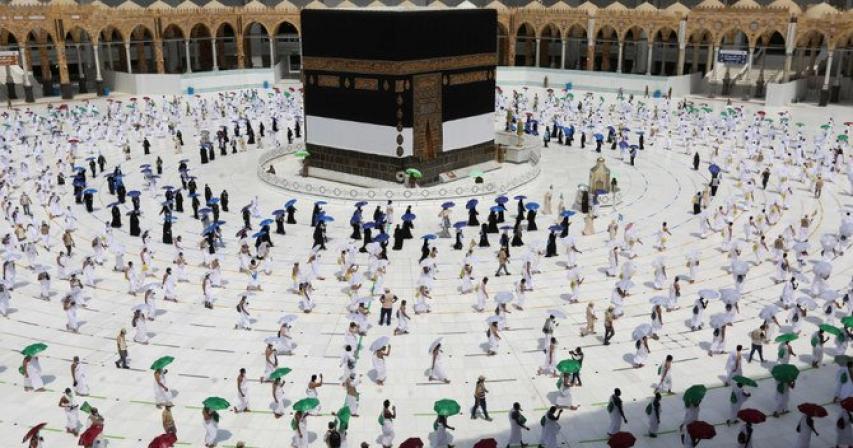Women police officers join Makkah’s Hajj security forces for first time

Saudi women police officers have been fronting Makkah’s security force for the first time during this year’s Hajj season.
Following last year’s government announcement that women could join the military service, female officers have been able to join their male colleagues in policing the holy city for the Muslim festival.
And with strict measures in place to stop the spread of the coronavirus disease (COVID-19) outbreak, the pilgrimage has been very different from normal.
Afnan Abu Hussein, who was among the first batch of women cadets to graduate from police service training, told Al-Ekhbariya TV: “This is a source of pride and happiness for us. Hajj is a very busy season for us, unlike normal days.”
Hajj began on Wednesday as pilgrims began their journey from the Grand Mosque in Makkah amid strict safety rules.
“Each group of pilgrims has a leader to facilitate and control their movement in order to ensure social distancing,” said Sari Asiri, director general of Hajj and Umrah affairs at the Ministry of Health.
“Moreover, each group is also accompanied by a health professional to monitor pilgrims’ health status and assist them when needed,” he added.
Ministry officials carried out a rigorous selection process to ensure the wellbeing of pilgrims before their arrival in Makkah.
“We visited each pilgrim at their home and did an overall test for their health condition, and we monitored them on a daily basis until they safely arrived at their hotels in Makkah,” Asiri said.
All workers serving pilgrims this year had also undergone health checks to ensure they were free of COVID-19, and Makkah hospitals and health centers have been readied to deal with any emergency.
Tarwiyah Day (fetching water), on Wednesday, was the first day of Hajj ritual. Pilgrims headed to the Grand Mosque to perform Tawaf and Saee between Safa and Marwah hills.
The few hundred pilgrims received at the Grand Mosque this year walked in their groups along specific pathways following their guide.
The movement protocols were designed and implemented by the General Presidency for the Affairs of the Two Holy Mosques in collaboration with the Ministry of Hajj and Umrah and security authorities.
The presidency has allocated specific entrance and exit doors for each group of pilgrims to prevent any crowding and ensure a smooth flow of movement and the organization of social distancing measures passed the efficiency test for the first day of Hajj.
Civil Defense Forces have stepped up their readiness in Mina to receive the pilgrims where they will spend the night before moving to Arafat mount.
Meanwhile, Saudi Public Security announced that it had arrested 244 violators of Hajj guidelines who had attempted to enter holy sites without permission. A spokesperson called on citizens and expats to abide by the law and Hajj instructions, stressing that security forces had imposed a tight cordon around Makkah and the holy sites.
Those caught at the holy sites without permission risk fines of up to SR10,000, with fines increasing for repeated violations.
Each year, about 2.5 million pilgrims descend on Makkah for the annual Hajj, but the COVID-19 pandemic has meant that only about 1,000 will be able to perform it this year.






Comments